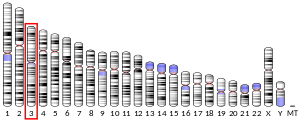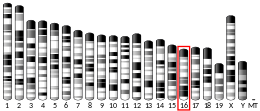Melanotransferrin
Melanotransferrin is a protein that in humans is encoded by the MFI2 gene. MFI2 has also recently been designated CD228 (cluster of differentiation 228).
The protein encoded by this gene is a cell-surface glycoprotein found on melanoma cells. The protein shares sequence similarity and iron-binding properties with members of the transferrin superfamily. The importance of the iron binding function has not yet been identified. This gene resides in the same region of chromosome 3 as members of the transferrin superfamily. Alternative splicing results in two transcript variants.[5] It is part of neural crest tissue, often present in melanotic neuroectodermal tumor of infancy.
References
- GRCh38: Ensembl release 89: ENSG00000163975 - Ensembl, May 2017
- GRCm38: Ensembl release 89: ENSMUSG00000022780 - Ensembl, May 2017
- "Human PubMed Reference:". National Center for Biotechnology Information, U.S. National Library of Medicine.
- "Mouse PubMed Reference:". National Center for Biotechnology Information, U.S. National Library of Medicine.
- "Entrez Gene: MFI2 antigen p97 (melanoma associated) identified by monoclonal antibodies 133.2 and 96.5".
Further reading
- Suryo Rahmanto Y, Dunn LL, Richardson DR (2007). "The melanoma tumor antigen, melanotransferrin (p97): a 25-year hallmark--from iron metabolism to tumorigenesis". Oncogene. 26 (42): 6113–24. doi:10.1038/sj.onc.1210442. PMID 17452986.
- Baker EN, Baker HM, Smith CA, et al. (1992). "Human melanotransferrin (p97) has only one functional iron-binding site". FEBS Lett. 298 (2–3): 215–8. doi:10.1016/0014-5793(92)80060-T. PMID 1544447.
- Garratt RC, Jhotí H (1992). "A molecular model for the tumour-associated antigen, p97, suggests a Zn-binding function". FEBS Lett. 305 (1): 55–61. doi:10.1016/0014-5793(92)80654-Y. PMID 1633859.
- Rose TM, Plowman GD, Teplow DB, et al. (1986). "Primary structure of the human melanoma-associated antigen p97 (melanotransferrin) deduced from the mRNA sequence" (PDF). Proc. Natl. Acad. Sci. U.S.A. 83 (5): 1261–5. Bibcode:1986PNAS...83.1261R. doi:10.1073/pnas.83.5.1261. PMC 323055. PMID 2419904.
- Furukawa KS, Furukawa K, Real FX, et al. (1989). "A unique antigenic epitope of human melanoma is carried on the common melanoma glycoprotein gp95/p97". J. Exp. Med. 169 (2): 585–90. doi:10.1084/jem.169.2.585. PMC 2189208. PMID 2463331.
- Sciot R, de Vos R, van Eyken P, et al. (1989). "In situ localization of melanotransferrin (melanoma-associated antigen P97) in human liver. A light- and electronmicroscopic immunohistochemical study". Liver. 9 (2): 110–9. doi:10.1111/j.1600-0676.1989.tb00387.x. PMID 2540389.
- Seligman PA, Butler CD, Massey EJ, et al. (1986). "The p97 antigen is mapped to the q24-qter region of chromosome 3; the same region as the transferrin receptor". Am. J. Hum. Genet. 38 (4): 540–8. PMC 1684788. PMID 3010712.
- Le Beau MM, Diaz MO, Plowman GD, et al. (1986). "Chromosomal sublocalization of the human p97 melanoma antigen". Hum. Genet. 72 (4): 294–6. doi:10.1007/BF00290951. PMID 3754536.
- Plowman GD, Brown JP, Enns CA, et al. (1983). "Assignment of the gene for human melanoma-associated antigen p97 to chromosome 3". Nature. 303 (5912): 70–2. Bibcode:1983Natur.303...70P. doi:10.1038/303070a0. PMID 6843660.
- Kennard ML, Richardson DR, Gabathuler R, et al. (1995). "A novel iron uptake mechanism mediated by GPI-anchored human p97". EMBO J. 14 (17): 4178–86. doi:10.1002/j.1460-2075.1995.tb00091.x. PMC 394500. PMID 7556058.
- Food MR, Rothenberger S, Gabathuler R, et al. (1994). "Transport and expression in human melanomas of a transferrin-like glycosylphosphatidylinositol-anchored protein". J. Biol. Chem. 269 (4): 3034–40. PMID 8300636.
- Rothenberger S, Food MR, Gabathuler R, et al. (1996). "Coincident expression and distribution of melanotransferrin and transferrin receptor in human brain capillary endothelium". Brain Res. 712 (1): 117–21. doi:10.1016/0006-8993(96)88505-2. PMID 8705293.
- Chi DD, Merchant RE, Rand R, et al. (1997). "Molecular detection of tumor-associated antigens shared by human cutaneous melanomas and gliomas". Am. J. Pathol. 150 (6): 2143–52. PMC 1858329. PMID 9176405.
- Richardson DR (2000). "The role of the membrane-bound tumour antigen, melanotransferrin (p97), in iron uptake by the human malignant melanoma cell". Eur. J. Biochem. 267 (5): 1290–8. doi:10.1046/j.1432-1327.2000.01079.x. PMID 10691965.
- Dias Neto E, Correa RG, Verjovski-Almeida S, et al. (2000). "Shotgun sequencing of the human transcriptome with ORF expressed sequence tags". Proc. Natl. Acad. Sci. U.S.A. 97 (7): 3491–6. Bibcode:2000PNAS...97.3491D. doi:10.1073/pnas.97.7.3491. PMC 16267. PMID 10737800.
- Suzuki Y, Tsunoda T, Sese J, et al. (2001). "Identification and characterization of the potential promoter regions of 1031 kinds of human genes". Genome Res. 11 (5): 677–84. doi:10.1101/gr.gr-1640r. PMC 311086. PMID 11337467.
- Sekyere E, Food MR, Richardson DR (2002). "A second melanotransferrin gene (MTf2) and a novel protein isoform: explanation for the membrane-bound and soluble forms of melanotransferrin?". FEBS Lett. 512 (1–3): 350–2. doi:10.1016/S0014-5793(02)02248-2. PMID 11852110.
- Food MR, Sekyere EO, Richardson DR (2002). "The soluble form of the membrane-bound transferrin homologue, melanotransferrin, inefficiently donates iron to cells via nonspecific internalization and degradation of the protein". Eur. J. Biochem. 269 (18): 4435–45. doi:10.1046/j.1432-1033.2002.03140.x. PMID 12230555.
- Strausberg RL, Feingold EA, Grouse LH, et al. (2003). "Generation and initial analysis of more than 15,000 full-length human and mouse cDNA sequences". Proc. Natl. Acad. Sci. U.S.A. 99 (26): 16899–903. Bibcode:2002PNAS...9916899M. doi:10.1073/pnas.242603899. PMC 139241. PMID 12477932.
- Guo J, Wen DR, Huang RR, et al. (2003). "Detection of multiple melanoma-associated markers in melanoma cell lines by RT in situ PCR". Exp. Mol. Pathol. 74 (2): 140–7. doi:10.1016/S0014-4800(03)00012-1. PMID 12710945.
External links
- MFI2+protein,+human at the US National Library of Medicine Medical Subject Headings (MeSH)
This article incorporates text from the United States National Library of Medicine, which is in the public domain.




